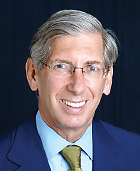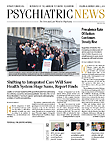The reward of a thing well done is having done it.—Ralph Waldo Emerson
As I entered the final month of my APA presidency, someone asked me how I would like this past year to be remembered. I responded that I wanted this time to be seen as “the year that APA got its mojo going.” This was the year that we confronted the need for change and didn’t shrink from the challenge. Instead, we addressed and embraced it with energy, creativity, and action, in ways that advanced psychiatry scientifically, socially, and politically and enabled it to better help patients and fulfill its mission.
When I was elected APA president, I believed my role was to set a clear vision, articulate expectations, engage talented colleagues in the work at hand—and then communicate with our members about what we were seeking to achieve and why. I wanted to use all of the power and influence of APA to speak out and stick up for our profession and our patients.
As I prepare to give up this important leadership role in American psychiatry, I want to thank APA members for giving me the opportunity to serve. I can reasonably hope that we have been at least partially successful in tackling the pressing issues that psychiatry faces and in making APA a better and more effective organization. I couldn’t have asked for a better or more dedicated team of individuals who helped me to move APA forward this past year.
The year began with the official launch of DSM-5. After experiencing a tumultuous gestation and overcoming numerous challenges, the fifth edition of APA’s diagnostic manual has proved a great success as reflected by favorable reviews, impressive sales, and gratifying clinical feedback.
At the same time, health care reform legislation has impacted psychiatry along with every other health care discipline. To advise and guide APA through this transformative process, we convened the Health Care Reform Advisory Committee (chaired by Howard Goldman) and recruited as members the leading experts in the country on health policy and economy. Because any policy or legislative initiatives that we sought to pursue would require a political and communications strategy, we recruited Patrick Kennedy as a special consultant to APA.
This group has worked hand in glove with APA staff to influence legislation and protect the interests of our profession and patients in various ways, including in the Affordable Care Act, the final rule of the Mental Health Parity and Addiction Equity Act, reversal of the unfavorable action by CMS to restrict the choice of psychotropic medications in Medicare Part D, and the pending bills introduced by Sens. Debbie Stabenow and Roy Blunt (Excellence in Mental Health Act) and Rep. Tim Murphy (Helping Families in Mental Health Crisis Act).
Mindful of the continuing stigma associated with mental illness and psychiatric treatment, we retained an outside consultant agency (Porter Novelli) to review APA’s communications capabilities, needs, and opportunities. Based on its report, we are now moving forward with an initiative to enact a sophisticated and proactive communications plan that will be directed both internally to APA members and externally to the media, mental health stakeholder groups, and the general public.
APA membership has also been an all-important priority in the past year, with a specific emphasis on identifying and responding to the needs of our resident-fellow members (RFMs) and early-career psychiatrist members (ECPs), as well as ensuring gender, racial, and ethnic diversity in the APA membership, leadership, and governance positions. Toward these ends, a Board of Trustees work group on how to make APA more relevant to younger members, co-chaired by Carolyn Rodriguez and Jonathan Amiel, provided an outstanding report and set of recommendations, including the staff appointment of a chief membership and RFM-ECP officer. In addition, Maria Oquendo was asked to chair an Assembly-Board work group on APA diversity, which will deliver its report at the July meeting of the Board of Trustees.
We have also appointed a committee (co-chaired by Grayson Norquist and John Rush) to carry out a comprehensive review of APA’s departments of Research and Quality Improvement and advise the APA Board and CEO on what are the most critical functions needed to serve the organization and its members in this period of great change and thereafter.
Finally, in the tradition of passing the baton, knowing that Jay Scully would be stepping down after the completion of more than a decade of service as APA CEO and medical director, we launched a search for a successor, and Saul Levin was appointed as our new CEO and medical director. I am happy to say that the transition has been very successful and would like to commend Jay, Saul, and the APA staff for their dedication and professionalism through this process. Saul has hit the ground running, and we look forward to his capable leadership and the staff’s continued outstanding performance.
It is an understatement to say that this year has been one of remarkable change in U.S. health care. It has also been a year of important changes for APA—many of which were in response to these larger transformations, and some because of the needs of our own profession. Much of the good fortune that I have enjoyed in leading APA over the past year is because of the efforts and accomplishments of my immediate predecessors, including Dilip Jeste, John Oldham, Carol Bernstein, and Alan Schatzberg. No matter how effective one is as president, the one-year term limits what can be achieved. Consequently, it is important that the baton of leadership be carried continually by the most capable members of our profession. I am confident that Paul Summergrad and Reneé Binder, who will follow me, respectively, as president, will sustain this trend in effective leadership. In this context, I encourage all APA members to consider how they can participate in APA activities and the governance process and to support the most capable candidates.
I hope that we will continue to move forward, with great energy, enthusiasm, and commitment to our profession, to serve our patients and help them lead the most productive and fulfilling lives possible. I look forward to continuing my participation in APA as past president (APA presidents never die; they just recede into the background) and returning to my day job at Columbia University and the New York State Psychiatric Institute. In doing so, I want to thank you for opportunity you have given me. ■
You can follow Dr. Lieberman on Twitter at
@DrJlieberman. To do so, go
here, log in or register, and click on “Follow.”

